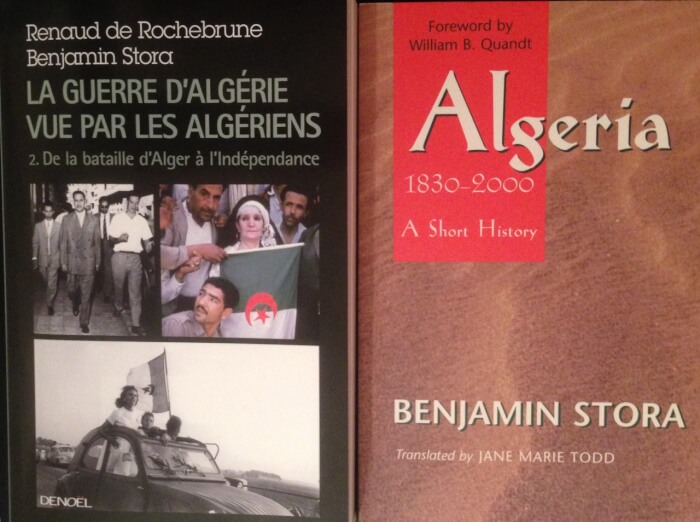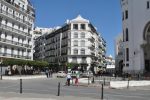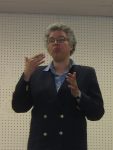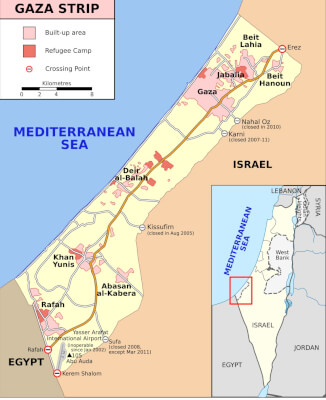Interview with historian Benjamin Stora
The transcript of The Arab Daily News story interview with Historian Prof. Benjamin Stora
By Abdennour Toumi
Bio: Prof. Benjamin Stora is Professor of History at the University of Paris, Saint Denis. He is the author of a dozen books on North Africa and the Arab communities of France.
October 17th marks the date of the massacre of 1961. To explore what this tragic event might represent to historians of the Algerian Liberation War and its historical and political consequences on today’s France’s immigration public policies. I met with professor Stora in his office at the History of Immigration Museum, Palais de la Porte Dorée in Paris
The Arab Daily News: Today, October 17th, marks the date of the massacre of October 17, 1961. What does this tragic event represent to the historians of the Algerian Liberation War?
Prof. Stora: Absolutely, it is an important and an essential historical marker, thousands of Algerian protesters pacifically paraded in the streets of Paris on that evening answering the call of FLN’s federations; though the repression of the French police was harsh and excessive. Actually, it is an important date longstanding in the history of the immigration for it is the date, which was little known and officially hidden for various reasons.
Now, after nearly twenty years under the impetus of the Human Rights activists, the anti-racist associations and the children of the generations of Algerian immigrants in France, who have been struggling for this date to be recognized, thus it is now in school textbooks, it is well known by the French, and indeed by the Algerians on the other side of the Mediterranean.
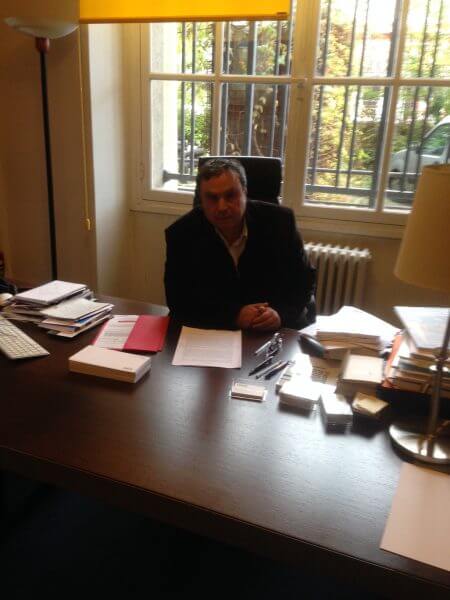
It is obvious, it is registered in a calendar of the history of the end of the Algerian Liberation War.
The Arab Daily News: What do you think about the issues of halal, the veil and secularism, particularly after the political episode of the summer, 2016, the infamous “Burkini” episode. Are the media and politicians allowing further stigmatization of the Muslims in France? Is the French identity threatened?
Prof. Stora: No, I don’t believe that the French identity is threatened. However, it is in full re-qualification and full redefinition, fundamentally regarding new populations with a new vision of the world affairs, drastically changed from the 50’s and 60’s eras, even the 70’s. An identity that is also facing a severe economic crisis and several million unemployed, it is a worrisome social crisis indeed. Then this leads to a redefining of the place of France in Europe and in the world, on the diplomatic level and in particular on the political level. Thus there are series of questions, which today span the French society and the political spectrum alike rapidly seeking possibilities in all these questions, which are asked today by the media and the public.
Naturally, the simplest recourse has settled on religion, namely Islam, a religion that counts several million believers in this country, which was not the case half-century ago.
Islam is a new religion in France
It is a new religion, Islam of “France,” it is very difficult to calculate the number of its believers, but Muslim culture, one could consider is between 5 and 6 million Muslims in France, who belong to this history, this tradition and this culture.
First of all, it is necessary to say how linked these questions are to the French history. The history of secularism, a Jacobin Republic that does not admit linguistic and religious plurality on the basis it is not confined in the private space. This is the closest classic definition one could employ to define French secularism. The expression of religious belief in the private space, while on the other hand the State protects the freedom of religion.

It is the contract that was agreed on, at the same time worship in the private space, while having to protect the freedom of religion by the State. We get the sense of a kind of “inequality.” If the faith can be practiced in the private space for the Muslims of France, this sense exists, and the State does not protect this faith enough. This feeling is shared by many Muslim believers today.
The problem of the protection of minorities and populations, who do not share Christian values and history in the broad cultural sense than a religious practice.
Clash of civilizations!
There is a sentiment that exists today, which does not mean in my opinion that there is an open religious war, but there are movements, political parties and organizations are pushing for the “clash” and the confrontation of civilizations and religious wars; clearly many of them would like to demonstrate this fantasy, and to say, there is a clash, then Islam is incompatible with the French Republic, hence with France.
The logic of war presses for the demonstration of the fundamental compatibility of Islam with the French Republican values.
The Arab Daily News: We often hear French politicians speak of an Islam of France. In your opinion what is Islam of France?
Prof. Stora: I do not know, I am not a member of France’s Islam foundation [created in 2005]. For me, my works are focused on North Africa, in particular on modern Algeria, which are not reduced to the religious practice of Islam. My works are extensive on the political and social questions, on the inter-actions’ problem, on the housing, on the socio-economic and political themes. Of course the religious question is important, but one cannot reduce all the history of the Algerian immigration or North Africans in France exclusively to the religious question.
There are other factors that could be taken into account, if one can examine the disputes that exist over this migratory history; it is not only the religious question, there is a political question, it is the question of the colonial memory.
We disregard this question, summing up everything in the religious question. It is important, now that the religious question is a challenge; once we have asked this question that is often forgotten Algerian immigrants, when they arrived in France in the 30’s and 50’s were concerned about the politics and their national cause not on religion. The religious question was one of the elements of identity, it was not the only element; today, unfortunately, we reduce all the history of the Algerian Independence War to the question between Islam and the West, that is not true.
Algerian Liberation War actions and demands had nothing to do with what ISIS is doing
This matter is stated in the national question. The actions that were undertaken during the Algerian Liberation War all had to do with national independence, and today has nothing to do with what ISIS (Dae’esh) is doing and preaching. We are using this historical amalgam, it exists frequently in certain works, certain books and in the discourse of the French extreme-right leaders, using the narrative of ISIS in their political discourse, comparing it to the Algerian Liberation War. No, it is not the same thing.
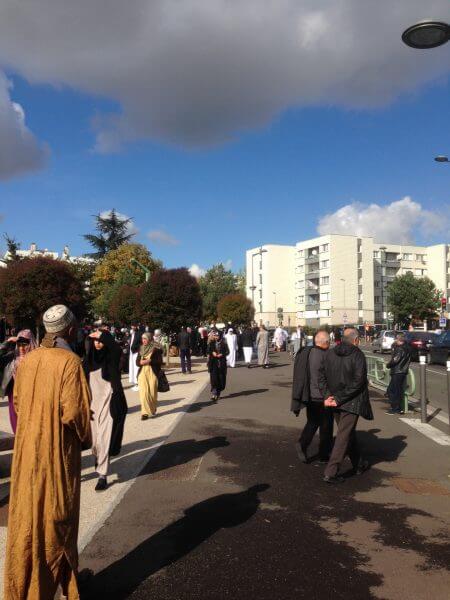
Precisely, there was an immigration, which was committed and acting on the political field, focusing on the national liberation rather than religion. It is not the same behavior or the same program, as a result, it’s not the same objective.
Thus these are very important questions, I am having difficulty asserting this point of view because we can absolutely remain locked into the question of what we can call religious essentialism. So, we remain locked in this kind of reasoning.
Of course there is the question of the role and the place of Islam in substance, the question concerns all religions, and there is no time to “create” special legal registers every time and singularly for Islam. No, there are many religions in France related to this matter, which should be looked at equally by the Republican State of France.
The Arab Daily News: Then an Islam minimalist.
Prof. Stora: I don’t know what the French State wants, does it want exclusively a confined Islam in a private space without being visible? Does it want to give to Islam a legitimacy? Let’s say, on the legal level, the same way as the other religions. It is necessary to decide, this is a question that belongs to political choices — yet the problem, the French politicians have slipped; in fact, the classic political borders that existed between the right and the extreme right or even between the left and the right have evaporated. In this instance, there was the French political right party that was historically attached to Gaullism with the decolonization policy, etc…
Yet, the problem nowadays is this right has shifted considerably on the classically extreme right-wing positions that was moreover anti-Gaullist. For instance, we saw it through the battle on March 19, 1962, in France, “Evian Accords.” That said, it was against General de Gaulle’s policy aligning itself on the extreme right’s positions and program. That’s the big problem.
France’s classic right political party identity crisis
That’s the question, there is a general political shift in the so-called French right. Once the political leaders shift certainly leaves marks on the society, if there are no words to appease or calm, then in that moment the political rhetoric expands and presses for the war of words that focuses in the public space.
An anti-Arab populist sentiment that overlays another sort of discourse, which is classically, let’s say, of hospitality and welcoming. It is addressed to minorities, and now especially seeks to find the means to make the policy of openness to happen for those, who are immigrants because many of the immigrants could integrate into the French society in a classic manner and a banal way.
It is the banalization problem that raises the issue here, in fact, one does apply the exceptionality over banalization.
The Arab Daily News: Could we speak about religious awakening of (political Islam and rigorist Islam) in France, as we are noticing in the Arab and Muslim countries?
Prof. Stora: So, the political shift phenomenon resulting from the issue of identity radicalization, religious fundamentalism. Summing up, we observe this phenomena in all the religions, and not simply in Islam. In France, the on-going street demonstrations that the media call “Manifs pour tous” (Demonstrations for All). There are demonstrations of religious rigorism and expression that are anchored in the society based on pretexts, e.g, marriage for all, etc…, large street protests are the mark of Catholic identity radicalization, in school they are questioning the ‘gender theory,’ which does not exist anywhere else.
The identity of radicalization for me, on the religious level does exist in connection with a weakening of the ideologies, the collective projects and the projects of society — what kind of project, we are proposing to the youth today? It should be presented by the political parties, the civil society associations and the intellectuals, etc… In the absence of strong political words and actions on projects for the future, young people and a fraction of the society have taken refuge in religion, it is a stand-by position.
Wait and see
It is a stand-by position, there is nothing else in the “store,” before there were Arab nationalism, socialism and communism. All which disappeared, all those thematics related to political militancy — roughly all linked and attached to Arab socialism and erased for the benefit of radical Islam, which appears with a political project and alternative.
It is a very old political project with the Movement of the Muslim Brothers of Hassen al-Benna in Egypt, this political project started at the end of the 19th century, the reformist Movement of Djamel e-Eddine al-Afghani, Mohammed Abdou and Rachid Redha, and early in the 20th century the Islamist project was thwarted by secular decolonization movements and the Arab nationalism ideology and project. These ideologies have been contained.
The ‘79 is a shifting year
The problem at the end of the 70’s, the collapse of Arab nationalism, in 1979 the Iranian Revolution, the Soviet invasion in Afghanistan, the appearance of political Shea’a currents in the Arab world and the hostage-taking of Mecca. So the year 1979 was a turning point in the dynamic of the political history in the Arab and Muslim world.
Then followed President’s Sadat assassination in October, 1981. In this shift in the years ’79, ’81, the Arab and Muslim youth generation was looking for a political train that arrived in the 90’s. The Arab youth continued in their search for a political and ideological project that never came, consequently they sought an answer in a religious refuge. That was the political drama. What we saw later in Algeria from 1992 to 2001, a bloody decade for which the entire country paid a very heavy price in this battle against radicalism.
The Arab Daily News: How are the Muslims of France living today, is it the consequence of the Algerian Liberation War? Does this war still haunt the politicians and the majority of the French electorate?
Prof. Stora: Yes and no, of course there are marks of the colonial memory in the French society, it targets the post-colonial populations, it’s true, and at the same time, no. In a very important fraction of the French society, in particular among the youth. There is a will also to be in another history, to get out of this traumatic history, it’s very important.
The nostalgia of French-Algeria era
Yet, the problem is a political elite is committed to maintaining the nostalgia for l’Algérie-française. This is the big problem, instead of turning over the page without erasing it and without tearing it. There are unfortunately politicians and certain French intellectuals, who came to use this memory as a kind of permanent electro-shock under the form of a revenge memory that I explained in my book appeared this year titled “Les Mémoires dangereuses” (The Dangerous Memories) published at Albin Michel.
Here is the danger, there is a will to exit from this memory, while there is a numb persistence that remains prisoner of this memory.
The Arab Daily News: Is there a parallel of comparison between the struggle for civil rights movements in the U.S., and the identity question of the immigrants’ children in France?
Black Panthers Party, Algerian ties
Prof. Stora: There is a parallel situation, the immigrants’ children post-colonial in France and the African-American movements of the 60’s and 70’s sought equal rights within the society, this is right. But at the same time, there is a deep difference. Why? Because in the U.S. the policy of the so-called Affirmative Action that was put in place in the 60’s beginning with Martin Luther King and lasting until the founding of the Black Panthers party on October 15, 1966, representing the most extreme social radicalism as armed citizens challenging police brutality, notably their only international chapter, directed by Leroy Eldridge Cleaver, operated in Algeria from 1969-1972, whom we like to say was born in Algeria!
The (preemptive) voluntarist programs, on the basis of quotas favored to get to the universities, the army and the companies. There is a policy that paves the road for a black elite, allowing an intermediate middle-class to emerge — the problem is that France is not used to such a policy as the Affirmative Action (Discrimination positive).
That said, there are no public policies like Affirmative Action, it does not exist in France.
The Arab Daily News: I believe that Sarkozy put it [discrimination positive] in place during his Presidential term, 2007-2012.
Prof. Stora: He wanted it, but he never applied it. He spoke about it, he wanted to apply the anonymous resume. In fact, it never existed, there were some empty proposals. There were statements after the 2005 banlieus‘ riots, there were political declarations, we have to help bring about a generation of immigrants as an intermediate middle-class, etc… politicians said. But it is not in the French tradition, once again, the French republican values traditionally are a Jacobin ones based on assimilation, on individual merit and furthermore on the culture origins’ detachment!
The French Jacobin tradition, assimilation and origin detachment
It is necessary to become detached from its origins to excel. This is the French tradition. Thus it takes much longer to achieve, it is much more complicated to let the elites emerge. At this level in the U.S., we excel quickly and see the emergence of an intermediate middle-class of the 70’s with the policy of Affirmative Action that resulted to the election of Barack Obama in 2008 sooner than in France. Though in France, we are far from the election of an equivalent of a Barack Obama, we are very, very, very far.
It’s true the French elected a President of immigrant origin in 2007, it was Sarkozy, but of Hungarian origins and Christian values, not North-African origin! I do not believe France will elect a Black President nor an Arab in the post-colonial trajectory in the large sense.
There is a delay because the decided policies of the State are not voluntarist policies to establish quotas in the army, the administration, the universities and in the public service. This is what was applied in the U.S., this policy has let Barack Obama to
become President and Colin Powell, the General-in-Chief of the U.S. Army (1989-1993). This started in the 60’s; in France, however, we are not in this type of process, which creates political tensions, etc…
If we were in this social process it would raise the question of all the themes of the classic French Jacobin Republic principals that are imperatives to pass through the school, the national exams and individual success, here it’s not community, it’s meritocracy.
Balancing act between affirmative action and meritocracy
It [Affirmative Action] has its disadvantages because we waste time, and could also create corruptions among the community members — however it has its advantages, it fabricates an elite that favors community lobbies, hence a dilemma. Therefore sometimes wanting to go too fast, we find ourselves in situations of pushing for stronger social ghettoization.
Look at the U.S., it has been applying this policy of Affirmative Action that put Barack Obama in the White House, and yet there is a real proof that ghettos still exist in America, the social poverty among the Afro-Americans is very strong, unemployment rates are skyrocketing and the prisons are full, etc…
All things considered
It is necessary to find an intermediate system between the Jacobin republican system that is rigid, which is based on meritocracy, on the other hand, a program of Affirmative Action à l’américaine that favors the increase of the community’s lobby power forward, and the emergence of an intermediate middle-class.
In this instance, it is necessary to find a balancing act social integration system.


- The Israeli-Palestinian Conflict: Is the Neither-Peace-nor-Security As-sumption Dominating Again? - June 7, 2021
- Algeria: “I Can See Clearly Now” - August 5, 2019
- Majesty Mohammed VI and General Gaïd Salah Tear Down This Wall! - July 29, 2019













